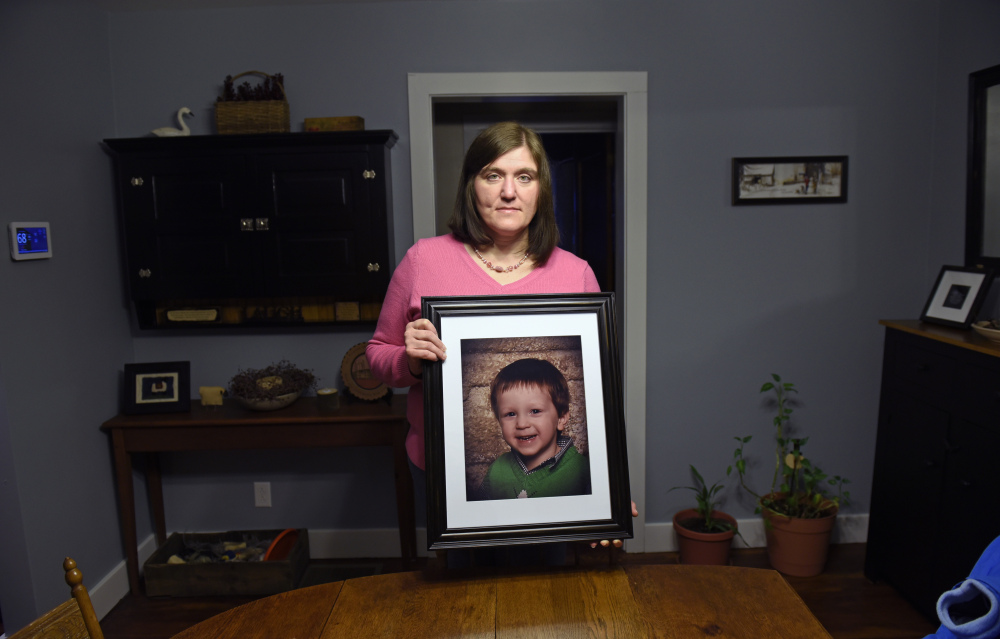IOWA CITY, Iowa — More than a dozen states have strengthened laws over the past two years to keep firearms out of the hands of domestic abusers, a rare area of consensus in the nation’s highly polarized debate over guns.
Lawmakers and governors of both parties have supported bills stripping gun rights from those who have been convicted of domestic violence-related crimes or are subject to protective orders. The measures have been backed by victims’ advocates, law enforcement groups and gun control supporters who see easy access to firearms as a major contributor to domestic violence killings.
Similar proposals are expected to be debated in several states this year.
“Domestic violence is definitely an area where there is the most agreement between the gun lobby and gun-violence prevention advocates,” said Allison Anderman, staff attorney with the Law Center to Prevent Gun Violence
in San Francisco.
Lawmakers of opposing political stripes put aside their differences in Maine to strengthen restrictions on gun ownership for people convicted of domestic violence crimes.
The state Legislature passed a law last year that keeps domestic violence criminals from owning guns for five years after the end of their sentences. The law goes beyond federal standards to protect victims of domestic violence, as well as to punish abusers, supporters have said.
Passing the law required cooperation between the Republican-controlled Senate and Democrat-controlled House. Legislators then overrode a veto by Republican Gov. Paul LePage, who is a supporter of both gun rights and curbing domestic violence. LePage supported the concept of the new restrictions but argued that the ban wasn’t lengthy enough.
The National Rifle Association has taken a cautious approach toward such bills, opposing the furthest-reaching measures but staying neutral or negotiating compromises on others. For example, the NRA has fought provisions that would require people to surrender their guns before they have a chance to contest allegations made in a request for an emergency protective order.
“There is no evidence that simply taking away people’s guns without a fair hearing makes the victims any safer,” NRA spokeswoman Catherine Mortensen said.
Approving new gun restrictions is a balancing act in Maine, a rural state where gun ownership and hunting are long-established parts of the culture in many areas. The key to the new law was to make sure it punished the right people, said Sen. Eric Brakey, an Auburn Republican.
“Of course we want to make sure that if truly dangerous people who have been committing violent crime in the past, that’s something where we’d want to look at having restrictions in place,” he said. “We have to have due process whenever we take someone’s rights away.”
Gun control advocates applauded the bill even as they took issue with other changes to gun laws in the state. Another new law in Maine that allowed legal gun owners to carry concealed handguns without a permit drew heavy criticism from gun safety groups.
“Protecting women from this clear and present danger is extremely important, and I am pleased that the nexus is recognized in this legislation,” said Tom Franklin, president of the Maine Gun Safety Coalition. “Five years is sufficient to deter such conduct, which is the entire point.”
The push in the states is driven by stories of women and children killed or wounded by known abusers, and by statistics showing that hostile relationships often turn deadly when guns are present.
An average of 760 Americans were killed with guns annually by spouses, ex-spouses or dating partners between 2006 and 2014, according to an Associated Press analysis of FBI and Florida data. Florida’s statistics are not included in the FBI’s report, which covers all other states and District of Columbia, but were analyzed separately by AP.
The total is an undercount because not all law enforcement agencies report such information, and it doesn’t include children and other bystanders who were killed. More than 80 percent of those killed were women.
Maine was the site of 24 firearm-related domestic homicides from 2006 to 2014. That is more than New Hampshire and Hawaii, which are the closest states to Maine in population, but less than Montana, which has fewer residents. The homicides were spread out evenly between the state’s more densely populated south and its vast, rural middle and north.
“The system failed my son, and I am going to do whatever it takes to make sure it never happens to another child or another woman,” said Hollie Ayers, 44, a Pennsylvania woman whose 2½-year-old son, Michael, was shot and killed in front of her by her abusive ex-husband in 2013. “Michael’s life to me was priceless. If you can at least reduce the amount of homicides, this is a no-brainer to me.”
Ayers, who was shot in the face and the leg, said she constantly thinks about her son, who loved tractors and puzzles. Her ex-husband killed himself after the rampage.
Ayers had warned that he had guns and had said that he, his ex-wife and the child “would be better off dead” before she obtained a permanent protection-from-abuse order, court records show. But the judge did not order her ex-husband to surrender his weapons, even after he violated the protective order.
Hollie Ayers is pushing for a Pennsylvania law that would require people to turn over their guns when judges issue protection orders against them.
Kim Stolfer, president of the Pennsylvania group Firearms Owners Against Crime, said his organization isn’t on board with the idea yet. He said such legislation could be exploited by vindictive ex-spouses who level false allegations of abuse.
“We need some balance, and it’s rapidly going the wrong way,” he said.
In announcing executive action on gun control last month, President Barack Obama said protecting domestic abuse victims is one of his goals. His changes include strengthening the federal background check system, which has denied gun sales 120,000 times since 1998 because of domestic violence convictions.
Federal law has long prohibited felons, those convicted of misdemeanor domestic abuse crimes and individuals subject to permanent protective orders from buying or owning guns. Critics say the federal law is too weak because it does not apply to dating relationships, does not ban guns during temporary protective orders, and does not establish procedures for abusers to surrender firearms.
States have been passing their own laws to match or exceed the federal prohibitions, delighting gun control advocates.
“We’ve passed them in blue states, red states and purple states,” said John Feinblatt, president of Everytown for Gun Safety. “We believe they are absolutely lifesaving.”
Some of the strictest state laws create processes for seizing firearms from abusers and extend gun bans to stalkers, abusive dating partners and those who are subject to temporary protective orders.
Studies by public health researchers have generally concluded that such laws, when properly implemented, can reduce deaths.
Gun rights advocates say some of the laws are applied too broadly.
“It encompasses everybody who has a one-time blip in their life, and all of a sudden their gun rights are taken away forever,” said Wes Dunbar, an Iowa lawyer who has represented defendants upset over losing their ability to hunt.
South Carolina and Wisconsin are two of the states dominated by Republicans and with a strong tradition of gun ownership that have taken steps to restrict abusers’ access to guns.
In Wisconsin, Gov. Scott Walker signed a law in 2014 requiring people subject to domestic abuse restraining orders to turn over their guns within 48 hours. The NRA stayed neutral after negotiating language that allows individuals to seek the return of their weapons once restraining orders are lifted.
Gov. Nikki Haley of South Carolina signed a measure in June that includes a life ban on gun ownership for the most serious domestic violence offenders.
“South Carolina is no longer thinking about the convenience of the abuser,” Haley said when she signed the bill in June. “South Carolina is thinking about strengthening the survivor.”
Send questions/comments to the editors.




Success. Please wait for the page to reload. If the page does not reload within 5 seconds, please refresh the page.
Enter your email and password to access comments.
Hi, to comment on stories you must . This profile is in addition to your subscription and website login.
Already have a commenting profile? .
Invalid username/password.
Please check your email to confirm and complete your registration.
Only subscribers are eligible to post comments. Please subscribe or login first for digital access. Here’s why.
Use the form below to reset your password. When you've submitted your account email, we will send an email with a reset code.